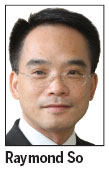Population policy is the first step
Updated: 2013-10-31 07:02
(HK Edition)
|
|||||||||
Last week the government issued the consultation paper on population policy. Although it is timely and important, there was much criticism accusing the government of having no concrete plans to curb the aging population problem. Given the current political climate, if government had laid down clear directions for combating the aging problem, people would say it already has its own agenda and that consultation is not genuine. Conversely, if government takes an open-minded approach, people accuse it of being ineffectual. The issue clearly demonstrates the difficulty of launching public policies in Hong Kong society nowadays.
This issue has been an outstanding item for a long time. However, the society has lent the matter little consideration. Better educated individuals, well aware of the problem for some time, have already built up their retirement reserves. The boom in the wealth management business parallels this trend. Also, when one goes to pricey restaurants during lunch time, apart from those on lunch breaks, many of the customers are retirees with sufficient retirement plans. For the man on the street, very often the issue of aging is too remote.
We all understand the need for more young people to lower the burden of an aging population, but accomplishing this aim is not easy. The consultation paper has four suggestions.
One is to attract more young talent to Hong Kong. This is a universal approach, but also a dangerous suggestion. Labor unions and political groups do not welcome the idea of importing more young talent to Hong Kong. They cite examples of how imported labor will lower people's salaries. Even though opposition voices are strong, the government still considers the idea of attracting more young talent. This shows the government is not afraid of criticism, which is the correct way to do consultation. After all, it is the responsibility of the government to put forward options for society to discuss. If the government is afraid of criticism and does not even mention attracting more overseas talent, it would not be doing its job.

The second suggestion is encouraging young couples to produce more children. This is easier said than done. Having children is a multi-dimensional decision-making process. The current consultation does not put forward any incentive schemes for having children. Chief Secretary for Administration Carrie Lam Cheng Yuet-ngor has said that overseas experience suggests giving incentives for procreation is not really effective. Nevertheless, getting more young couples to have more children is a natural solution and the government still has to go for it. From this angle, we can tell that the government is fighting an uphill battle.
The third suggestion, attracting overseas Hong Kong residents back to Hong Kong, is also another difficult task. In the first place, those people must have valid reasons for leaving Hong Kong. This idea is a beautiful concept but hard to realize. If we cannot resolve the original concern, the suggestion is not likely to bear fruit.
The fourth suggestion is to delay retirement age. Many countries have adopted this approach, but Hong Kong's situation is different. Many countries delay the retirement age because of the burden on the national pension system. Hong Kong does not have retirement protection, so delaying it does not help government solve the aging problem. It may help reduce the burden on social welfare but the problem persists. Delaying retirement age may also affect the upward mobility of the next generation. This suggestion requires careful consideration.
The current consultation is a good start. The real challenge now is how to deal with the problem. In some respects, we already know the good and bad in each suggestion and the choice should not be that difficult. Nevertheless, aging is both a social and political issue. No matter which direction the government takes, there will be criticism. Now the government must be determined enough to push forward its solutions.
The author is dean of the School of Business at Hang Seng Management College.
(HK Edition 10/31/2013 page1)